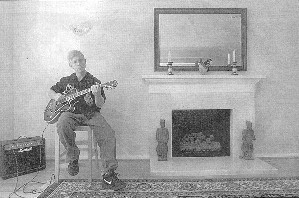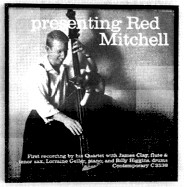WHITTIER
In Finding Father, He Solved a Musical MysteryBy JOHN L. MITCHELL, LA TIMES STAFF WRITER -- July 25 2001 |
||||
|
||||
|
If you doubt genes set the course of human behavior, please meet Whittier Mayor Allan Zolnekoff.
His loving and hard-working parents--Dad polished bumpers and Mom ironed clothes--had few visible talents. Zolnekoff said they couldn't carry a tune in a bucket. So where did young Allan get his passion for guitar? And what about that shocking red hair? For decades the answers were locked in the files of the Florence Crittenton Home for Unwed Mothers, where Zolnekoff was born in 1953. Social workers told his adoptive parents little about the infant, except that he came from a musically gifted family. They passed on one request from the baby's birth mother: that the boy be raised by a traditional Russian family. The baby was 2 months old when he was delivered to Annie and Paul Zolnekoff, filling up their modest Whittier home. "We were so happy, because finally we had a baby," recalled Paul Zolnekoff, now 82. Zolnekoff's adoption was never a secret, even though the circumstances of his birth remained a mystery. "From the time I was young my parents told me the story about how when I was brought home from the adoption agency I was so small that my father was too scared to hold me," Zolnekoff said. "It was a perfect way to tell me about my adoption. I always knew." But something was always missing in his life, he said, something out of kilter. "When you're adopted," he said, "you don't always feel like you belong." So began a common quest of adopted children--but one that yielded some unusual answers. As a boy, Zolnekoff would sing himself to sleep. Later, inspired by Muddy Waters, Jimi Hendrix, Bob Dylan and others, he taught himself guitar, and then harmonica. Although music was important, it was never Zolnekoff's true calling. He became an electrical systems planner for Southern California Edison. But as mayor of Whittier's 83,000 residents, he has learned to play politics with a musician's ear. "It's the closest thing to performing I know," he said. "You have to be sensitive, sometimes loud and assertive. Anger is even valid at a council meeting. You play all the emotions--just like Miles Davis." He grew up on Whittier's working-class south side and doesn't mind comparing himself to Richard Nixon, another home-grown politician. Since his first election to the City Council in 1992, Zolnekoff has gained the reputation of being a tireless campaigner. He shocked his colleagues on the council by switching from the Democratic Party to the Republican Party five years ago, and then returning to the Democratic Party. "I am conservative as a Democrat, but for a couple of years I was a liberal Republican," he said. "A lot of this is fueled by the fact that some believe that in Nixon's hometown you have to be born in the party to be a Republican. There was nothing I could do to measure up to their standards." Critics, like former Mayor Victor Lopez, say Zolnekoff has too big an ego. "Too much I, I, I. He goes to everything and puts himself up front," Lopez said. Quest to Find Birth Parents Began in 1981 Growing up, Zolnekoff said, he never gave too much thought to finding his birth parents. "Had I had a dysfunctional upbringing, I would have been in a serious search," he said. "But my parents did a good job of raising me." |
He took up the quest in 1981, around the time his then-wife, Janice, was pregnant with their first child. The couple was concerned about the possibility of genetic abnormalities. He asked his parents and learned that he was born Glenn Terrence Mitchell.
Zolnekoff contacted an agency that helps adoptees and birth parents find each other. To his amazement, the agency had two letters for him on file. "You have grandparents in North Hollywood who have been looking for you," Zolnekoff recalled the woman saying. After being unable to reach them by telephone, Zolnekoff and his wife drove to the house and knocked on the door. An elderly man opened the door. " 'Hi! I'm Glenn Terrence, your grandson.' He said 'Who?' 'I'm Glenn Terrence, your grandson.' And then he said, 'Oh! Come in! Come in! Sit down! We've been looking for you.' " William Mitchell's hands were shaking as they sat on the living room sofa of the house in North Hollywood. There was no denying it, he thought: The visitor had his father's distinctive red hair, and Mitchell soon learned he had his musical touch. Grace Mitchell, the grandmother, had been in the shower when the visitors arrived. When she joined the conversation, the two grandparents spoke repeatedly about Keith. "They said, 'Keith this,' 'Keith that,' " Zolnekoff recalled. "Finally, I asked 'Who is Keith?' " They answered: "He's your father." Glenn Terrence Mitchell was the only child of jazz bassist Keith "Red" Mitchell and Dunya "Doe" Samoyloff, a part-time actress. [Samoyloff is a common Doukhobor surname, and many are excellent singers. See Jon Kalmakoff's Origin and Meaning of Doukhobor Surnames.] During a 40-year career, Red Mitchell was featured on more than 1,000 albums. He died in 1992 at 65.
His first steady gig was on 52nd Street in New York in 1948, playing in a trio opposite Charlie Parker's quintet. He followed Charles Mingus as the bassist with Red Norvo's trio and later worked with the Gerry Mulligan Quartet, Andre Previn, Hampton Hawes, Ella Fitzgerald and Dizzy Gillespie, among others. "He was an extraordinary musician who could fit in with anybody," said Nat Hentoff, a veteran jazz journalist. In 1956, Hentoff wrote: "Red Mitchell has become not just one of the better young bassists, but one of the most creative bassists in all jazz. He is consistently impressive in his solos, building with flowing, horn-like phrasing that is never stale, and invariably reaching mature, satisfying climaxes. His tone is full and firm, and he is clearly aware of the expressive virtues of shading." Mitchell's personal life was not so smooth. His marriage to Samoyloff was on the rocks when their son was born in 1953--the same year Red shared the Down Beat Referendum in the New Star category. A year later, Red Mitchell was playing for jazz singer Billie Holiday in Stockholm. The grandparents tried calling Red Mitchell that afternoon, but he wasn't home. Since 1968, he had been living in Stockholm, where he found the political, racial and economic climate more to his liking. Meanwhile, other family member arrived, including Red's younger brother Gordon "Whitey" Mitchell, also a bass player, and his daughter, Lesley Mitchell-Clarke. "I came right over that day," said Mitchell-Clarke, a Toronto publicist and jazz writer. "It's a wonder someone didn't have a heart attack. I took one look at him. The red hair, his height and face. He was obviously family--the spitting image of Red. For years I had been the eldest grandchild, but now I felt the family was complete." At the impromptu reunion, Zolnekoff recalled thinking about the depth of musical talent in the Mitchell clan. Not only was his father an accomplished musician, but so was his uncle, his cousin, Lesley, and her brother, Brian, who played saxophone for Ray Charles. Even William Mitchell, his grandfather, played pipe organ. (And as it turned out, Zolnekoff's two children, Amy and David, had inherited the musical gene.) |
Father Wrote a Song as Tribute to Son
Weeks after the reunion, Red Mitchell flew in from Japan, where he had been working, and met with his son. They pressed their palms together. "Holding my hand up with Red's, I noticed how amazingly similar we were, and as artists I felt we understood each other," Zolnekoff said. Mitchell would write "Love's not only the blues," a tribute to his son and the Zolnekoffs. It was more difficult connecting with his biological mother, who suffered from a form of lupus. "We wrote letters to her in Sacramento, but she never responded," Zolnekoff said. "We weren't sure if she even wanted to see me or not. So we drove there and knocked on the door. I was afraid she would slam it. So I brought my son. "She looked at us and immediately cried," he said. Samoyloff seemed to be overwhelmed with guilt. She hadn't done well. "It was as if her giving me up happened yesterday," Zolnekoff said. They tried to console her by telling her that the decision to put him up for adoption was the right one. After her death, he read her diaries and discovered that his father had pressured his mother to put their baby up for adoption. Within the small Russian immigrant community of East Los Angeles the Zolnekoffs knew of the Samoyloffs, his birth mother's family. Looking back, Zolnekoff said he wishes he could have done more to relieve her guilt. "I would have been dragged from hotel to hotel in the jazz, drugs and drinking world," he said. "I told her I had wonderful parents growing up. I could clearly see that they made the right decision, and I had no regrets." Red was living in Salem, Ore., when he suffered a heart attack and massive stroke in late 1992--the same year his son was first elected to the Whittier City Council. Zolnekoff flew up to be with his father before he died. "We were standing around for five days on shifts as he died," Zolnekoff said. "We literally felt him pass away. He gradually faded, faded and then his heart stopped. . . . I felt cheated. Things were just coming together." Letters to the Editor July 29 2001 "In Finding Father, He Solved a Musical Mystery" (July 25), about Whittier's Mayor Allan Zolnekoff learning that his father was jazz bassist Red Mitchell, brought to mind the many times I was fortunate enough to hear Mitchell play in the 1950s. He played at the Lighthouse in Hermosa Beach and The Hague in L.A. He often played with Hampton Hawes, Art Pepper and Gerry Mulligan. Mitchell's solos were beautiful, lyrical creations with a great depth of feeling. Zolnekoff is lucky he found his father and his music. Theron Wyatt As an adoptee and new natural mother, I can relate to Zolnekoff's story. Adoption separated me from my natural family for over 34 years. Like Zolnekoff, I feared rejection from my mother. Zolnekoff told his mother that the decision to put him up for adoption was the right one. I no more wanted to thank my mother for giving up the right to raise me than I want my son to tell me one day that he wishes I'd given him to someone else. Only after I became a mother myself did I realize the strong bond that mothers develop while their children are in the womb. I have talked with many mothers who have lost their children to adoption, and I've yet to meet one who doesn't in some way regret her decision. A tragedy occurs in all adoptions, that of breaking the mother-and-child bond. Tricia Shore |
||


